Our Plaza condo faces east, and we get a variety of sunrises depending on the cloud formations. Just before the sun rose on Super Bowl Sunday, this was our view. I took a similar photo on the morning of the AFC championship game against Buffalo. In both cases, we were hoping KC’s bright red sky was a good omen for a Chiefs victory.

You all know what happened. Congratulations to our Kansas City Chiefs! The newest NFL dynasty!
When I showed Pat Titterington this sunrise photo, he gave me a good line: “Red sky in morning, 49ers take warning. Red sky at night, Chiefs’ delight.” The red sky at night was provided by the red-clad Chiefs fans at the game, including David and Vicki Block who were captured by CBS (screenshot from our TV):

But this being a baseball newsletter, I must take note…

Taylor is right. Royals’ pitchers and catchers started working out this week in Surprise, Arizona. There is an air of excitement around this year’s team. In the off-season, the Royals spent big money on several free agents and a long-term contract for Bobby Witt Jr. Bobby is on a roll with long-term commitments (below from two months ago)…
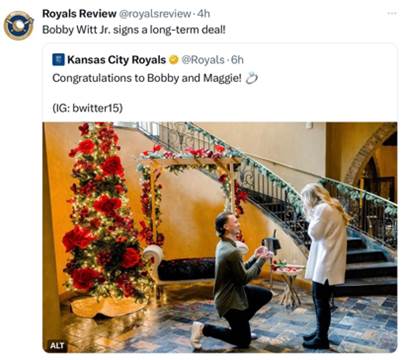
And on Tuesday, the Royals confirmed the Downtown/Crossroads location for their proposed new stadium.

The issue will go before the voters on April 2. In an early campaign moment…
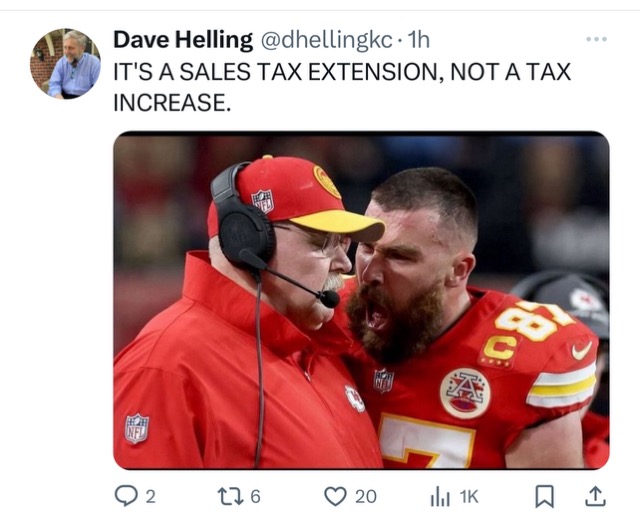
Stay tuned for a big spring.
Weed Alert! Weed Alert!: On the advice of Hot Stove Managing Editor Rita Leifhelm, I am posting this Weed Alert!

Rita lets me know when I “get down in the weeds” with baseball details that might not be so interesting to baseball-casual subscribers. So, this is your opportunity to scroll past Slow Pitches and go to Slow Horses. Rita approves Slow Horses.
Slow Pitches/The Eephus: When Zack Greinke initially played for the Royals, 2004-2010, he had a fastball that exceeded 100 mph. As the years went by, his fastball slowed, but he became craftier by adding new types of pitches and deftly changing speeds. When Zack returned to the Royals in 2022, he was in his 19th year in the majors. A key reason for his longevity was his ability to keep hitters off balance, including the occasional slow curve that is sometimes referred to as his “eephus” pitch.
In MLB.com’s glossary of baseball terms, the definition and origin of the term eephus includes this comment: “Zack Greinke is famous for surprising hitters with an eephus on occasion, one of the only modern-day pitchers to use the eephus with any frequency.”
I’m not sure when Zack was first credited with throwing the eephus, but this video shows several examples when he was with the Arizona Diamondbacks (2016-2019). The announcers alternate calling the 60-70 mph pitch a slow curve and an eephus.
Zach next went to Houston, and on August 23, 2020, he famously got a strike on a pitch clocked at 54 mph (click here). His Topps card going into the 2021 season included this narrative:
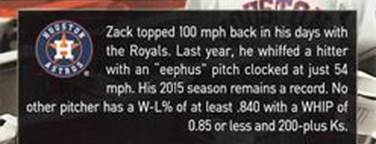
On April 12, 2021, Zack threw a 51-mph pitch that floated past Renato Nunez for a called strike (click here). Check out this tweet comparing Zach’s fastball as an early Royal and his eephus as an Astro.

Zack’s 51-mph eephus caught the attention of Ben Zimmer who writes a language column (“Word on the Street”) for the Wall Street Journal. The graphic for his column shows a high-looping pitch. Although Zack Greinke’s eephus has a serious vertical drop, it does not compare to the blooper thrown by Rip Sewell who was the first pitcher to throw the eephus regularly.
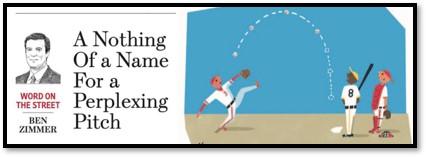
In seeking the etymology of the word, Zimmer checked out Sewell who had several good years with the Pittsburgh Pirates in the 1940s. Sewell was adept at throwing a slow pitch with a high trajectory, finishing with the ball floating across the plate as it came down. The batter, expecting a fastball at nearly twice the speed, would often swing too early or not at all.
According to baseball lore, Sewell’s teammate Maurice Van Robays called the pitch an “eephus,” and when asked why, he said, “Eephus ain’t nothing, and that’s a nothing pitch.” Sewell later said his teammate was referring to a word that meant “nothing” in another language (he wasn’t sure which one). Several baseball historians have theorized that it came from the Hebrew word “efes,” meaning nought or nothing. But Zimmer found no evidence that Sewell or his teammates knew any Hebrew.
So, I consulted Hot Stove’s Hebrew expert Dan Margolies (co-host with Michael Stern on “The Kansas City Symphony on Classical KC”). Dan is skeptical. “While the Hebrew word efes (אפס) does indeed mean zero or nothing, I suspect this is a weird coincidence. Van Robays was a Catholic kid from Detroit and not likely to have known Hebrew or Yiddish. Had a Jewish player from the era, say Hank Greenberg, come up with the word, then I’d be more inclined to lean to the Hebrew/Yiddish theory of its roots. Also, there is a difference in pronunciation. The Hebrew pronunciation is EF-ess. A baseball announcer says EEF-is.”

The most famous eephus thrown by Rip Sewell was to Ted Williams in the 1946 MLB All-Star Game (graphic below). Ted, after fouling off one eephus pitch and seeing another called a ball, sent the next one over the fence for a home run (video here). How big a moment? It almost made Joe Posnanski’s 50 moments for his book Why We Love Baseball. Rather than leaving the story on the cutting room floor, Joe wrote about it in an Esquire article last year.
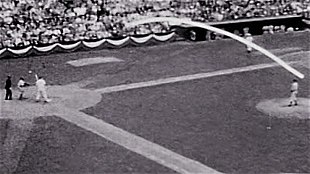
Rip Sewell and Zack Greinke have had memorable eephus pitches, but the most successful eephus was thrown by Bugs Bunny. The pitch was so slow that it struck out three batters (video here).

To close out this section, I turn to author and poet Steve Paul who is also known for saving Willie Wilson’s life (Hot Stove #243).

Eephus (by Steve Paul)
The ginkgo tosses its fruit,
a bounce off the roof,
like an eephus,
a loopy, slow-motion lob like
some baseball pitchers toss,
a green orb with so much
potential, but not knowing
its future—to rot? to tree?—
the mystery the magic
of something from nothing,
like the universe, say,
if you can believe
in the lore, if not the lord,
the eephus origin
in a Hebrew word.
Slow Horses: The “slow” eephus pitch prompts me to pass along a TV series recommendation. Rita and I have enjoyed all three seasons of Slow Horses, a spy thriller about MI5 agents who have bungled their job and are assigned to administrative purgatory at Slough House. Their leader is played by a very entertaining Gary Oldman. Trailer here. Pro Tip: Turn on the subtitles (which we do for almost all shows now, especially those with British Isles accents).

Calvin Trillin at Rainy Day Books Event: Calvin Trillin is returning to his native Kansas City to promote his new book, The Lede: Dispatches from a Life in the Press. Rainy Day Books is hosting the event at 7:00 on February 28 at Unity Temple on the Plaza. Trillin will be in conversation with Washington Post columnist David Von Drehle. For details about the new book and ticket info, click here.
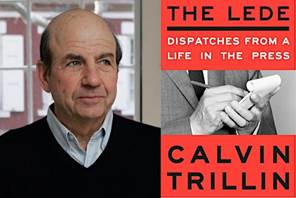
Trillin endeared himself to his hometown with articles in the New Yorker and in his book American Fried: Adventures of a Happy Eater (1974). I still have my copy of the book and took it off the shelf to reread the first two lines: “The best restaurants in the world are, of course, in Kansas City. Not all of them; only the top four or five.” The barbecue at Bryant’s and the hamburgers at Winstead’s became famous nationwide.
My personal favorite from Trillin is Messages from My Father (1996). I learned from this book that he had a grandfather who emigrated from Kyiv to the United States in 1907. My grandfather Andrew Lukomski also came to the U.S. in 1907, leaving his small village outside Lviv. Kyiv and Lviv are in current day Ukraine. Our grandfathers entered the U.S. through Galveston, and Trillin wrote of how he found entry information about his grandfather at a museum in Galveston. This prompted a visit Galveston where I was able to find the ship manifest with my grandfather’s name and personal immigration information (race, age, occupation, read or write (no), anarchists or polygamist (no), cash ($10), etc.).
Rita and I visited Ukraine in July of 2018 to see if we could find more records of my ancestors (we did, very cool). We visited four other Eastern European countries that shared with Ukraine a history of invasion, occupation and oppression by the Nazis and Russia. While we were in Ukraine, Vladimir Putin (following in the footsteps of fellow bullies Hitler and Stalin) was actively threatening and partially occupying Ukraine. In February of 2022, Putin’s Russia invaded. Some have called Putin “genius,” “smart” and “savvy.” My words are “bully,” “thug” and “corrupt.”
Please stand with Ukraine.
Lonnie’s Jukebox (1) – Musical Instrument Museum: Rita and I were recently in Arizona to visit expatriate KC friends. While there, we visited the Musical Instrument Museum in Phoenix. In a word – superb. It’s like going to the Rock and Roll Hall of Fame but covering all genres and countries via a massive collection of instruments and videos. Website here. Highly recommended!

One area special to me was the Eastern European section where side-by-side exhibits represented the countries of my paternal grandparents (Lithuania) and maternal grandparents (Ukraine).

The written materials were a reminder of the Putin/oppressor mindset. During occupation, the Soviets dictated instrument and music selection to repress folk culture. Soviet-sponsored choirs and folkloric groups were formed to water down local traditions, but the locals held to their culture as a form of resistance. So, I repeat myself. Please stand with Ukraine.
The guitar shown below belonged to Peter Yarrow of Peter, Paul and Mary. It still has his taped handwritten setlist on the body of the instrument.
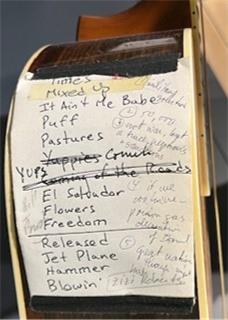
This guitar was played by Yarrow in 1986 at the inaugural celebration of Martin Luther King Jr. Day as a holiday. At the event, Peter, Paul and Mary sang “Blowin’ in the Wind” with Bob Dylan (who wrote the song) and Stevie Wonder (at the 3:30 mark in this clip).
![Bob Dylan, Peter, Paul and Mary, and Stevie Wonder performing “Blowin' in the Wind” , Kennedy Center, Washington, D.C., January 20, 1986 - the first Martin Luther King, Jr. day [1440x985] : r/HistoryPorn](https://lonniesjukebox.com/wp-content/uploads/2024/03/bob-dylan-peter-paul-and-mary-and-stevie-wonder.jpeg)
Lonnie’s Jukebox (2) – “We Are the World”: Bob Dylan and Stevie Wonder were also part of USA for Africa, a supergroup that recorded “We Are the World” in 1985. The record was a fundraiser for African famine relief. The Greatest Night in Pop, a new documentary of the making of the record, is now running on Netflix (trailer here). The combined musical genius in one room for an overnight recording is astounding. Don’t miss it.
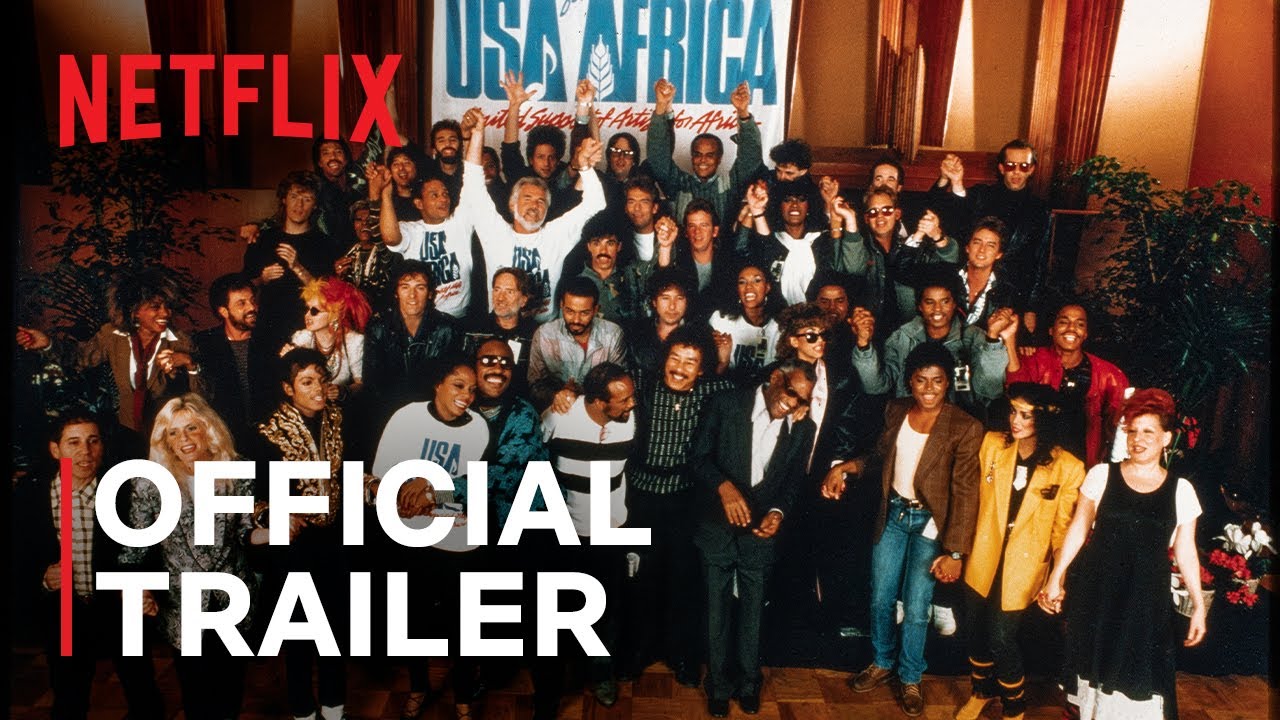
Lonnie’s Jukebox (3) – The Grammys: On the open Sunday between the AFC/NFC Championships and the Super Bowl, the Grammys were handed out. For the occasion, Bill Carr sent me this New Yorker cartoon:
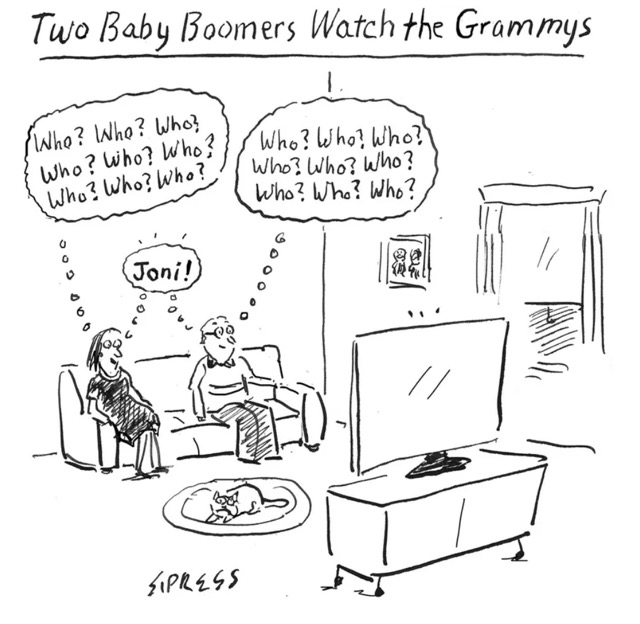
This certainly hit home with me. When I looked at the artists nominated for album of the year, I recognized some of the names, but can’t even come close to humming any song on these albums (but I know every word of “Rock Around the Clock” from 69 years ago). The nominees: Jon Batiste, boygenius, Molly Cyrus, Lana Del Rey, Janelle Monae, Olivia Rodrigo, Taylor Swift and SZA. [Super Bowl Trivia: One of Taylor Swift’s friends in the stadium suite was Lana Del Rey.]
So, stealing a line from retired NY Times sportswriter George Vecsey who wrote a similar article, this is an octogenarian report on the Grammys.
I of course know who “Joni” is in the cartoon. Joni Mitchell (80) gave her first-ever Grammy performance this year. It was one of the highlights of the evening.
“Both Sides Now” by Joni Mitchell, joined by Brandi Carlile and others. Joni wrote this song which became a hit for Judy Collins in 1969. Joni also took home the Grammy this year for best folk album – Joni Mitchell at Newport (Live).

Another highlight was the pairing of Tracy Chapman and country singer Luke Combs singing “Fast Car,” Chapman’s first hit from her 1988 debut album. Two months after that album was released, she appeared at the Nelson Mandela 70th Birthday Tribute at Wembley Stadium in London. She performed her scheduled set of three songs and then added two more when she was rushed back on stage to fill time after Stevie Wonder’s equipment had technical problems. Her live version of “Fast Car” at Wembley is a classic (click here). After this appearance, her album sales exploded (went to #1) and the “Fast Car” single went to #6.
Luke Combs covered “Fast Car” in 2023, and it went to #1 on the country charts – the first time a solo composition by a Black woman was a #1 country hit. She also received the CMA Award for Song of the Year, the first Black songwriter to ever win the award.

“Fast Car” by Tracy Chapman and Luke Combs at the Grammys. Chapman’s original 1988 version has had a surge in sales and streaming after the Grammys and is back on Billboard’s Top 100 chart.
“In Memoriam” clips for Tony Bennett (Stevie Wonder), Sinead O’Connor (Annie Lennox) and Tina Turner (Fantasia). I of course knew some of these songs.
The biggest award of the night, Album of the Year, went to Taylor Swift for Midnights. One of the cuts from the album is “Karma,” which includes these lyrics:
’Cause karma is my boyfriend/
Karma is a god
Karma is the guy on the screen
Coming straight home to me
While performing on tour in Buenos Aires, Swift famously modified the lyrics on the night Travis Kelce was in attendance – “Karma is the guy on the Chiefs/Coming straight home to me.”
“Karma” by Taylor Swift. This is a short clip with the modified lyrics (and Travis) in Buenos Aires. For the recorded version of the full song, click here.
Minutes after the Super Bowl ended, a Taylor Swift fan account with three million followers tweeted “KARMA IS THE GUY ON THE CHIEFS.”
Below, Rita at the Taylor Swift exhibit in the Musical Instrument Museum.
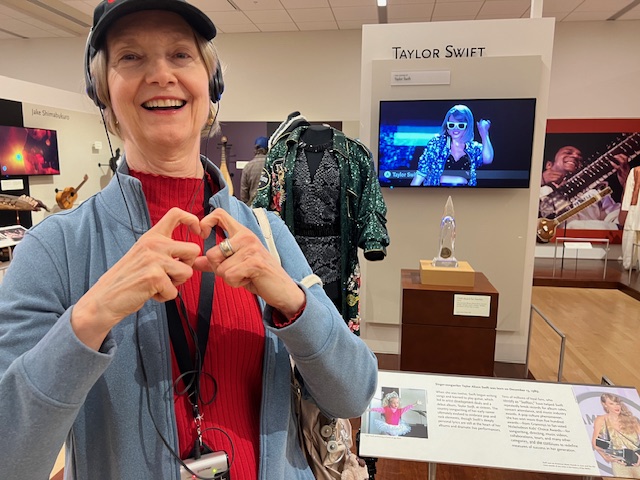
Other people I did not know sang songs I did not know. I liked a good number of them.
The “walk-off” song to end the night was performed by Rock and Roll Hall of Famer Billy Joel.
“You May Be Right” by Billy Joel.
Lonnie’s Jukebox (4) – Kevin Harlan: For the finale of this Jukebox festival, I return to the Super Bowl. I’ve grown weary of Tony Romo’s commentary on NFL games. After the Super Bowl, Rita spotted a link to Kevin Harlan’s radio call of the final plays of the game. It’s so good. Click here.
Closing Note: I planned to finish this post with a photo of the Super Bowl celebration at Union Station. But the shooters (and their enablers) extracted the joy from that scene.
Sportswriter Jason Gay: “Another mass shooting, a ritual sadly now as American as the Super Bowl itself.”
Assault rifles (and their enablers) have won another round “because these unending attacks on human rights matter less than preserving gun rights to those who could enact changes” (quoting from Vahe Gregorian’s post in the Kansas City Star).
More from Vahe:
So you could only wonder when it might explode here as it did on Wednesday, when we became international news for entirely different reasons than the way the day began.
When we went from unbridled joy to mourning, especially for the direct victims but also for a city itself wounded.
And when our children were taught anew that nowhere is safe.
With no end in sight.